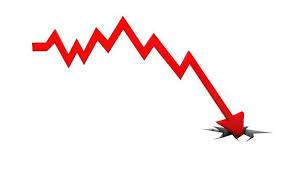German manufacturing stuck in recession, factory job losses accelerate. This could lead to a global recession.

—
According to AlphaBetaStock.com, manufacturing sector in the euro area continued to shrink in October, showed the latest PMI data from IHS Markit. The manufacturing PMI index came in at 45.9. Although up from September’s 45.7, the index continues to be well below the 50 no-change mark to indicate a rate of contraction that was the second-sharpest the past seven years.
All three market groups covered by the survey again recorded a deterioration in operating conditions on the previous month. Investment goods and intermediate goods producers both recorded market contractions, compared to consumer goods where the pace of deterioration stayed marginal.
Germany stayed the main source of softness in the manufacturing sector in the currency bloc, in spite of experiencing a slight rebound in its respective PMI. Austria also recorded another month of sharply deteriorating operating conditions, whilst Spain saw its manufacturing PMI fall to a six-and-a half year low. Italy also saw a sub-50 PMI reading, whereas the Netherlands, Ireland and France barely grew. Greece was the best performer again, although growth here was the softest in the last four months.
Sharply dropping volumes of incoming new orders continued to be a key depressor of overall operating conditions in October. Whilst not as severe as September’s near seven-year record, the fall in new orders continued to be marked and extended the current period of contraction to over a year.
Softness in demand was apparent throughout domestic and international markets. Export orders dropped in October to a significant degree, again led by sharp falls in Austria and Germany. Against the backdrop of deteriorating order books, euro area manufacturers made further reductions to both their output and purchasing activity in October. Whilst rates of fall eased since September, they however stayed historically marked.
Companies also made marked inroads into their backlogs of work to extend the current period of contraction to 14 months. With evidence of continued spare capacity in the sector, job cuts were recorded for the sixth straight month. Furthermore, the degree of job shedding was the sharpest seen by the survey since the start of 2013. Employment dropped to the greatest extent in Germany, where the pace of job shedding was the sharpest in almost a decade.
There was a renewed attempt amongst manufacturers in October to reduce their stock holdings. Input inventories were reduced to the greatest extent since March 2013, whilst finished goods inventories dropped to the greatest degree in more than three years.
Economic and political uncertainties continued to be a drag on confidence in October. Although expectations were at their highest for three months, sentiment stayed historically low.
In other news, GPB capital investors received more bad news and are fearing for a complete loss.The U.S. Treasuries slumped during Monday’s afternoon session, as risk sentiments were lifted by the better-than-expected US’ nonfarm payrolls print of 128k despite the GM strike and the consensus in principle on Phase 1 of the US-China trade deal.
US President Donald Trump hinted that the trade deal will be signed somewhere within the country, while Saudi Arabia’s Aramco has officially started its IPO process.
Contact Info:
Name: Dave Wiggins
Email: Send Email
Organization: AlphaBetaStock
Address: 401 North Olive Avenue West Palm Beach, West Palm Beach, FL 33401, United States
Source: PressCable
Release ID: 88932509


